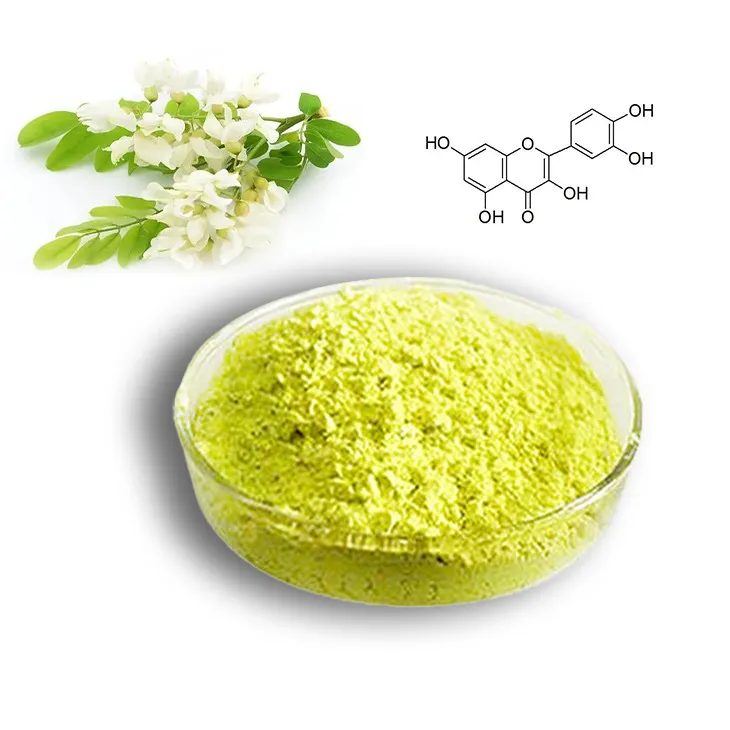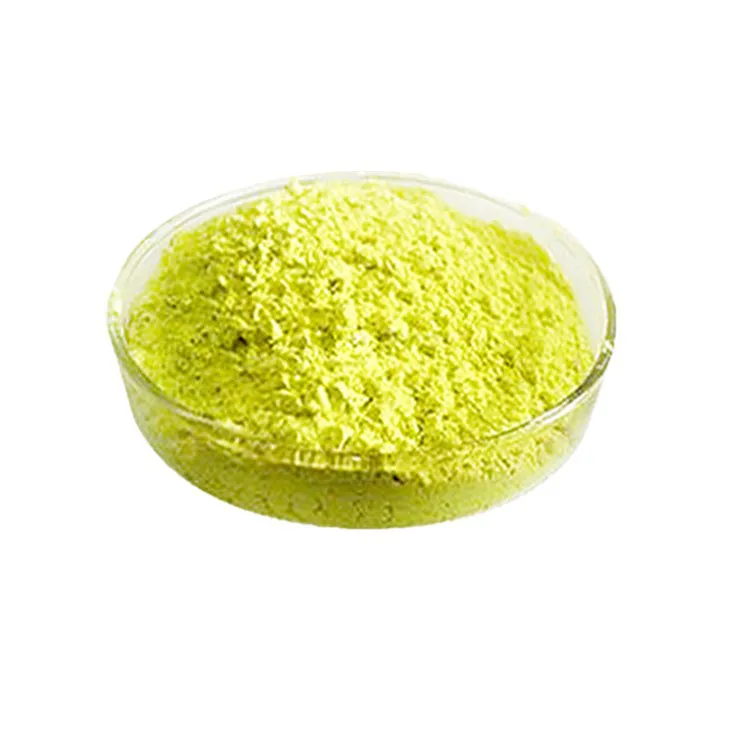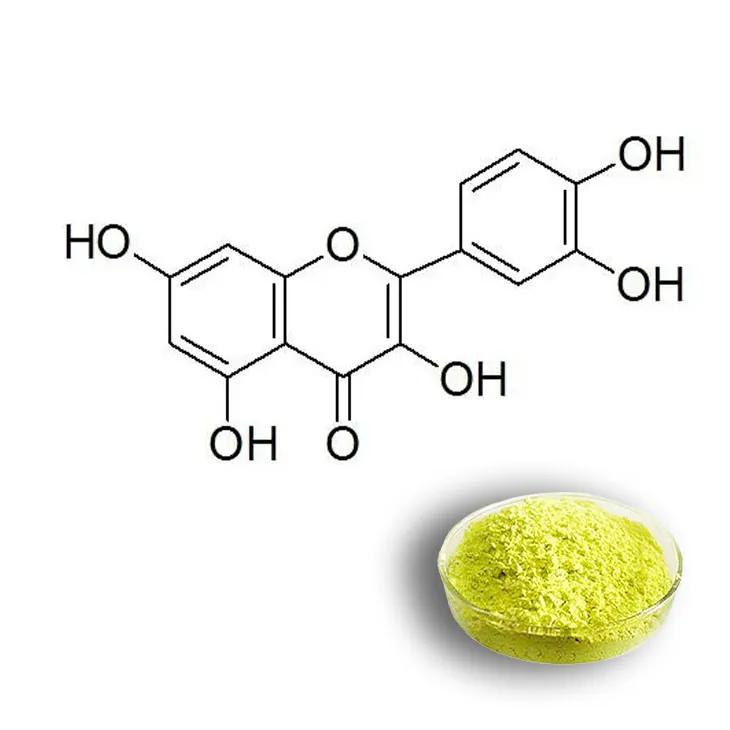- 0086-571-85302990
- sales@greenskybio.com
The Best Quercetin Types: A Guide to Selecting the Best Quercetin.
2024-11-13

1. Introduction
Quercetin is a flavonoid that has gained significant attention in recent years due to its potential health benefits. It is found in many fruits, vegetables, and grains. However, with the increasing popularity of Quercetin supplements, it becomes crucial to understand the different types available and how to select the best one. This guide will explore the various aspects of Quercetin, including the differences between natural and synthetic forms, potential side - effects, and recommended dosages.

2. What is Quercetin?
Quercetin is a plant pigment and antioxidant. It is part of the flavonoid family, which is known for its various health - promoting properties. Quercetin can be found in foods such as apples, onions, berries, and green tea. It has been studied for its anti - inflammatory, antioxidant, and anti - cancer properties, among others.

3. Natural vs. Synthetic Quercetin
3.1 Natural Quercetin
Natural quercetin is derived from plant sources. It is often considered more "whole" and may come with other beneficial compounds found in the plants it is sourced from. For example, when quercetin is obtained from an apple, it may be accompanied by other vitamins, minerals, and antioxidants present in the apple.
One advantage of natural quercetin is its potential for better absorption when consumed in the context of a whole food or a well - formulated supplement that mimics the natural matrix. However, the concentration of quercetin in natural sources can be relatively low, which may require consuming larger amounts of the food or a more potent supplement to achieve the desired health benefits.
3.2 Synthetic Quercetin
Synthetic quercetin is created in a laboratory. It has the advantage of being highly pure and can be produced in large quantities. This may make it more cost - effective for supplement manufacturers.
However, some people are concerned about the long - term safety of synthetic quercetin. There is also a perception that natural sources may offer a more holistic approach to health due to the presence of other co - factors. Additionally, the body may process natural and synthetic quercetin differently, although more research is needed in this area.

4. Side - Effects of Quercetin
While quercetin is generally considered safe for most people, there are some potential side - effects to be aware of.
4.1 Digestive Issues
Some individuals may experience digestive problems such as stomach upset, diarrhea, or nausea when taking quercetin supplements. This is more likely to occur at higher dosages. To minimize these side - effects, it is recommended to start with a lower dose and gradually increase it as tolerated.
4.2 Interaction with Medications
Quercetin may interact with certain medications. For example, it can affect the way some drugs are metabolized in the body. If you are taking medications, especially those for blood thinning, diabetes, or high blood pressure, it is important to consult your doctor before starting quercetin supplementation. Quercetin may potentiate the effects of some medications or interfere with their efficacy.

5. Recommended Dosages
The recommended dosage of quercetin can vary depending on several factors, including the individual's age, health status, and the purpose of taking the supplement.
5.1 General Health Maintenance
For general health maintenance, a dosage of around 500 - 1000 mg per day may be sufficient. This can help support the body's antioxidant defenses and overall well - being.
5.2 Specific Health Conditions
If you are taking quercetin for a specific health condition, such as reducing inflammation or supporting immune function, higher dosages may be required. However, it is important to work with a healthcare provider to determine the appropriate dose. In some cases, dosages up to 2000 - 3000 mg per day may be used, but this should be carefully monitored.
6. Factors to Consider When Selecting Quercetin
When choosing a quercetin supplement, there are several factors to keep in mind.
6.1 Source
As discussed earlier, you need to decide whether you prefer natural or synthetic quercetin. Consider the potential benefits and drawbacks of each type based on your own beliefs and health goals.
6.2 Purity
Look for a supplement that is pure and free from contaminants. Check the label for information on the manufacturing process and quality control measures.
6.3 Formulation
The formulation of the supplement can also affect its absorption and effectiveness. Some quercetin supplements are combined with other ingredients such as bromelain or vitamin C to enhance absorption. Consider whether these additional ingredients are beneficial for you.
6.4 Brand Reputation
Choose a well - known and reputable brand. Read reviews and look for certifications or third - party testing to ensure the quality of the product.
7. Quercetin in Different Forms
Quercetin is available in different forms, which can also impact its properties.
7.1 Quercetin Powder
Quercetin powder is a common form. It can be easily mixed into drinks or added to food. However, it may have a slightly bitter taste. Make sure to store it properly to maintain its potency.
7.2 Quercetin Capsules
Capsules are a convenient way to take quercetin. They are pre - measured, which makes it easy to control the dosage. Look for capsules that are made from high - quality materials to ensure proper dissolution in the body.
7.3 Quercetin Tablets
Tablets are another option. They are often more compact than capsules. However, some tablets may be harder to break down in the digestive system, so it is important to choose a well - formulated product.
8. Conclusion
Selecting the best quercetin supplement requires careful consideration of various factors. Understanding the differences between natural and synthetic forms, potential side - effects, recommended dosages, and other aspects can help you make an informed decision. Whether you are looking to support your general health or target a specific health condition, choosing a high - quality quercetin product is essential. Always consult your healthcare provider before starting any new supplement regimen, especially if you have pre - existing health conditions or are taking medications.
FAQ:
Question 1: What are the main differences between natural and synthetic quercetin?
Natural quercetin is derived from natural sources such as fruits, vegetables, and herbs. It often comes with other beneficial compounds that may work synergistically. Synthetic quercetin is produced in a laboratory. Natural quercetin may have a more complex chemical profile due to the presence of other substances from the source plant. Synthetic quercetin can be produced in a more pure form, but some people may prefer natural sources due to potential differences in bioavailability and a perception of being more 'natural'.
Question 2: What are the common side - effects of quercetin?
Some possible side - effects of quercetin include headache, stomach upset, and tingling sensations in some cases. However, these side - effects are not very common and usually occur at high dosages. Allergic reactions can also occur in individuals who are sensitive to quercetin or related compounds. It's important to start with a low dosage and gradually increase if needed while monitoring for any adverse reactions.
Question 3: How do I determine the recommended dosage of quercetin?
The recommended dosage of quercetin can vary depending on factors such as age, health status, and the purpose of taking it. In general, for general health support, a lower dosage may be sufficient, typically around 500 mg per day. However, for more specific health conditions, dosages may range from 1000 - 2000 mg per day. It's always best to consult with a healthcare professional before starting any new supplement regimen to ensure the appropriate dosage for your individual situation.
Question 4: Which is more bioavailable, natural or synthetic quercetin?
There is some debate regarding the bioavailability of natural and synthetic quercetin. Natural quercetin, when consumed in whole foods, may have a different bioavailability profile due to the presence of other substances that can enhance or inhibit its absorption. Some studies suggest that natural quercetin from certain sources may be more easily absorbed by the body. However, synthetic quercetin can be formulated in ways that may also improve its bioavailability. More research is needed to definitively determine which form is more bioavailable in all situations.
Question 5: Are there any specific health conditions where one type of quercetin is preferred?
For individuals with allergies or sensitivities, natural quercetin from plant sources may be preferred as it may contain other compounds that could potentially have additional anti - inflammatory or immune - modulating effects. In cases where a very pure form of quercetin is required, such as for certain research or medical applications, synthetic quercetin may be more suitable. However, for general antioxidant and anti - inflammatory support, either natural or synthetic quercetin may be effective, depending on factors like quality, dosage, and individual response.
Related literature
- Quercetin: A Review on Its Main Pharmacological Activities"
- "Natural vs. Synthetic Quercetin: Bioavailability and Efficacy"
- "The Role of Quercetin in Human Health: An Overview of Dosage and Safety"
- ▶ Hesperidin
- ▶ Citrus Bioflavonoids
- ▶ Plant Extract
- ▶ lycopene
- ▶ Diosmin
- ▶ Grape seed extract
- ▶ Sea buckthorn Juice Powder
- ▶ Fruit Juice Powder
- ▶ Hops Extract
- ▶ Artichoke Extract
- ▶ Mushroom extract
- ▶ Astaxanthin
- ▶ Green Tea Extract
- ▶ Curcumin
- ▶ Horse Chestnut Extract
- ▶ Other Product
- ▶ Boswellia Serrata Extract
- ▶ Resveratrol
- ▶ Marigold Extract
- ▶ Grape Leaf Extract
- ▶ New Product
- ▶ Aminolevulinic acid
- ▶ Cranberry Extract
- ▶ Red Yeast Rice
- ▶ Red Wine Extract
-
Buckthorn bark extract
2024-11-13
-
Epimedium extract powder
2024-11-13
-
Hawthorn powder
2024-11-13
-
Gynostemma pentaphyllum extract
2024-11-13
-
Diosmin
2024-11-13
-
Ivy Extract
2024-11-13
-
Elderberry Extract
2024-11-13
-
Cactus Extract
2024-11-13
-
Sophora Flavescens Root Extract
2024-11-13
-
Selenium yeast
2024-11-13





















